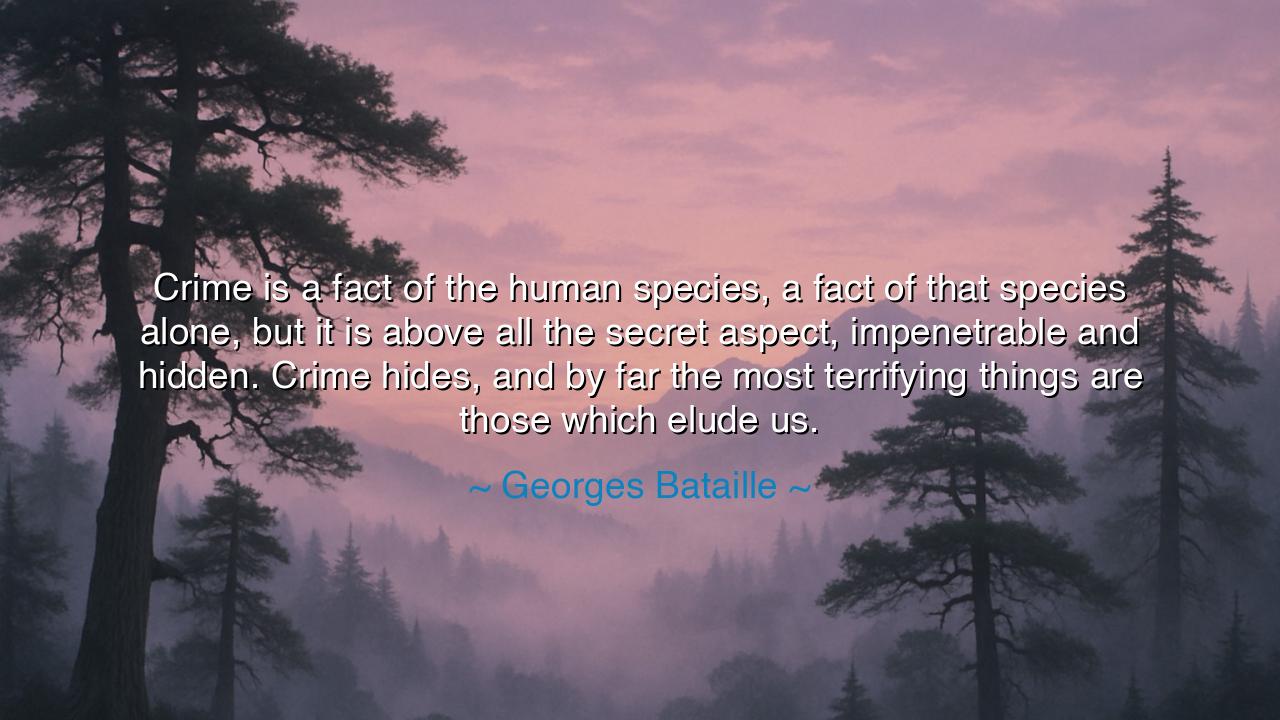
Crime is a fact of the human species, a fact of that species
Crime is a fact of the human species, a fact of that species alone, but it is above all the secret aspect, impenetrable and hidden. Crime hides, and by far the most terrifying things are those which elude us.






In the dark yet luminous words of Georges Bataille, the philosopher of shadows and transgression, we encounter a truth that pierces the veil of human nature: “Crime is a fact of the human species, a fact of that species alone, but it is above all the secret aspect, impenetrable and hidden. Crime hides, and by far the most terrifying things are those which elude us.” These words do not speak merely of theft or murder, but of the abyss within the human soul — that secret chamber where the forbidden lives, where morality trembles before desire, and where the most terrifying truths are not those we see, but those we conceal.
The origin of this thought arises from Bataille’s lifelong fascination with the sacred and the profane — his belief that within man dwells both the divine and the monstrous, inseparable and forever at war. Unlike beasts, who kill for need or instinct, man commits crime for meaning — for passion, for pride, for revolt against the order that confines him. Crime, in this sense, is not merely a violation of law, but a revelation of the human condition: the yearning for freedom even when that freedom destroys. It is the shadow cast by consciousness itself, proof that our capacity for reason is matched only by our capacity for chaos.
Bataille calls crime the secret aspect of humanity — “impenetrable and hidden” — because it is not confined to acts of violence; it lives also in thought, in fantasy, in the silent impulses we deny. It is the part of ourselves we cannot confess, yet cannot erase. Every civilization, every religion, builds walls to contain it — laws, rituals, punishments — yet those walls tremble because what they imprison is part of us. To look upon our evil is to look into the mirror of our own creation, and this is why, as Bataille says, “the most terrifying things are those which elude us.” What eludes us is not the monster outside, but the one within, cloaked in the garments of our civility.
The ancients knew this terror well. In the myth of Oedipus, the hero who sought truth discovered that his crime had been committed long before he knew it — that destiny itself had conspired to reveal the darkness within him. In Dostoevsky’s Crime and Punishment, Raskolnikov’s murder is less a story of blood than of conscience — a descent into the hidden labyrinth of guilt and revelation. And in every age, from the courts of kings to the alleyways of cities, the same story repeats: humanity invents virtue not to escape sin, but to define it. For without crime, we would not know what innocence means.
Consider the life of Gilles de Rais, the French nobleman who once rode beside Joan of Arc — a hero turned murderer, a saint’s companion transformed into a monster. History remembers his crimes with horror, yet beneath the cruelty lies a deeper tragedy: that the human soul can rise to such light and fall to such darkness within the span of a single life. His story, like those of so many tyrants and fallen angels, reveals Bataille’s truth — that what is most terrifying is not the act of evil, but the mystery of how it can dwell in the same heart that once loved, prayed, and dreamed.
From this truth emerges a lesson not of despair, but of awareness. To deny the existence of evil within us is to give it power; to face it is to understand it. The crime that hides within the human soul — envy, cruelty, lust for domination — cannot be eradicated, but it can be known. The ancients taught that the path to wisdom begins with self-knowledge. So too must we look upon our darkness without flinching, for what we hide only grows stronger in shadow. When we see clearly the potential for harm within ourselves, we also awaken the strength to choose compassion, to build instead of destroy.
Therefore, my child, do not fear the darkness of mankind, nor your own. Fear only blindness — the refusal to see. The hidden crime is not in the act, but in the silence that surrounds it, the ignorance that allows it to fester. The world’s greatest evils have always been born not from monsters, but from ordinary men who forgot to look within. Let this be your practice: to know yourself wholly — the light and the dark, the law and the transgression. For only when the hidden is brought into the open does it lose its terror.
And so, remember Bataille’s wisdom: that what is most frightening is not what we can see, but what we refuse to see. The soul’s shadows are not enemies, but teachers — mirrors through which we glimpse our wholeness. To be human is to stand between innocence and guilt, order and chaos, creation and destruction. The task is not to banish one for the other, but to walk with both, awake and unafraid. For when the hidden is unveiled, the world — trembling and ecstatic — will at last kneel at the feet of its own truth.






AAdministratorAdministrator
Welcome, honored guests. Please leave a comment, we will respond soon